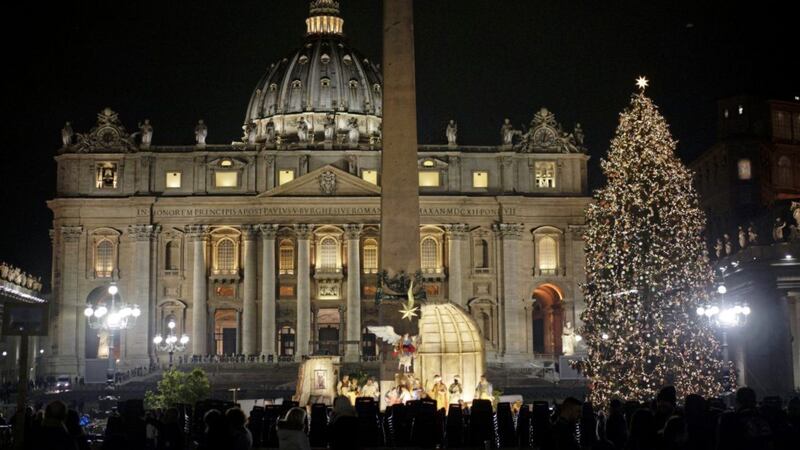CHRISTMAS is now a time when people almost feel obliged to 'look on the bright side' of life.
Yet it would be difficult to deny that for much of its history, Christianity has also tended to stress the darker side of human existence.
In fact, even Christ's birth itself, celebrated specifically at Christmas, finds little mention in the writings of Christianity's first major exponent, St Paul.
The only faint echo found there of Christ's actual birth is the reference in Galatians 4:4 to God sending "his Son, born of a woman".
In recent times, however, the balance between sadness and joy in the Christian view of life seems to be tilting perceptibly towards joy as the fundamental key to the essence of Christianity. And the way Christmas is now celebrated may be a token of this fairly recent change.
Traditionally, Catholic Christianity has, of course, long been associated with an attitude that could be fairly characterised as joyful, not to say jovial.
One only has to think of the popularity of festivities, pilgrimages, and holidays in more unselfconsciously Christian times, to be convinced of the truth of this assertion.
The term 'holiday' itself is a byword for the prospect of relaxation in contrast to the pressure and stress of daily working life, and it is a term derived from the Church's 'holy days'.
Through the establishment of 'holy days,' Christianity wished to offer its followers at least a glimpse of divine peace and happiness as an indispensable aspect of the truth of religion.
Yet, as I have already mentioned, there is also a tendency within Christianity, running counter to the notion of celebration.
In quite early times, because of the various concessions made to the desire for a less severe, more colourful expression of religion, the Catholic Church was indeed even accused of attempting to 'paganise' original Christianity, or to 'humanise' it.
By the time of the Reformation, it is reckoned that the Church celebrated about 100 feast days per year. These were days when no-one had to work.
The Reformation, however, took a much sterner attitude to work, despite its emphasis on the importance of faith over works, and abolished most of these feast days.
The Puritans even denounced Christmas day as 'the Multitudes' Idle Day'.
The old idea that work was a punishment for original sin and idleness the last remnant of Paradise was replaced with a brisker notion of work as the sanctification of the world by the righteous under God's grace.
So, all things considered, did Christianity wish to present existence as one long holiday, with Christmas as increasingly the highpoint of the year's festivities?
The Reformation took a much sterner attitude to work, despite its emphasis on the importance of faith over works, and abolished most of these feast days. The Puritans even denounced Christmas day as 'the Multitudes' Idle Day'
And if it did, was it right to do so? For, as I have already intimated, there is another, rather different, and stricter strand in the Christian tradition, going back at least to St Ignatius of Antioch (c.35-c.107), if not to St Paul himself, who, for all his calls to his flock to rejoice in the Lord, was an intense, brooding, restless Apostle, driven by the conviction that he had a message of incomparable, transcendental significance to deliver about human salvation, while there was still time.
St Paul's picture of Jesus is a deeply serious one, and it was to become the dominant, though admittedly - were one to think, say, of St Francis (1181/1182–1226), the creator of the crib - not the only, image of Jesus in Christian history.
While legend has it that Zoroaster was born laughing, and the Buddha is often represented as smiling, Jesus is, by contrast, usually represented - in religious art supremely, but not only there - as serious.
Is Christianity, then, really more about being grimly and relentlessly focused on ultimate questions of life and death and human destiny, than about being happy or at least seeking to be happy?
Is the notion of a huge celebration at Christmas perhaps out of character with Christianity's deepest meaning?
Catholic Christianity would, I think, unambiguously have to come down on the side of celebration.
And for an irrefutable reason. It is true that from ancient times onwards a strand of western thought, sometimes colouring Christianity, has seen birth as an unmitigated disaster.
Early Christianity had to combat the pessimism of the gnostics, as they were known, by refusing to identify Creation with the Fall.
In this process, the indisputable value of life - inherited from the Jewish tradition, such as Genesis 1:31: "God saw all that he had made, and it was very good" became, despite evil and suffering and death, a non-negotiable dogma of the Christian faith.
It seems to me that it is this ancient teaching of Christianity that is ultimately at stake in the festivities of Christmas.
And it will and must always find a concrete mode of expression for as long as the Christian faith survives.
- Martin Henry, former lecturer in theology at St Patrick's College, Maynooth, is a priest of the diocese of Down and Connor








